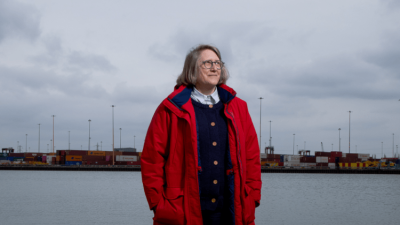
Rewriting Women into Maritime makes London International Shipping Week debut
Rewriting Women into Maritime makes London International Shipping Week debut.

This event starts on
The Design Museum, London. Hybrid event.
Conference
Hosted by Lloyd’s Register Foundation in partnership with the Red Cross Climate Centre and Anticipation Hub, in association with the World Bank, the London Satellite Hub of the Understanding Risk Global Forum (UR22) took place at the Design Museum on 29 November 2022.
This event provided an opportunity for risk practitioners from across the UK, Europe and beyond to come together, in person and online, to discuss and hear from leading experts on themes including understanding and managing compound risks and best practice in risk communication. The event also showcased new findings from the Lloyd’s Register Foundation World Risk Poll on issues from disaster resilience to risks associated with the use of personal data and AI.
This event will be of interest to anyone with a role or interest in understanding and managing risks to safety, including from government, academia, international institutions, NGOs and the private sector. It is a satellite event of the Understanding Risk Global Forum taking place in Florianopolis, Brazil from 28 November to 2 December 2022.
Lloyd’s Register Foundation is partnering with the Red Cross Climate Centre, the Anticipation Hub, Sense About Science and the Institute for the Public Understanding of Risk to deliver the UR22 London Satellite Hub. The event is being run in association with the Global Facility for Disaster Reduction and Recovery and the World Bank as the overall coordinators of UR22.
Held in The Atrium.
Watch the recording of this session here.
Reflecting on over three decades of personal experience in international humanitarian work, Richard Blewitt, Executive Director of International at the British Red Cross, will open the UR22 London Satellite Hub by providing a humanitarian perspective on the challenges of managing compound risks around the world – illustrated by recent examples of how these risks manifest in humanitarian needs in places such as Somaliland and the Sahel, where people are facing a perfect storm of compounding risks including conflict, drought, flooding, food insecurity and Covid-19.
Watch the recording of this session here.
Every day, thousands of people all over the world are helping their communities to make sense of risk. These community risk practitioners have often been innovating in how to convey risk messages or question information. They are uniquely placed to know what their community knows and needs, but their expertise is often missing from global conversations about risk. Despite the different cultures and varied environments they each work in, they also often have similar needs. Diverse risk practitioners are making many of the same discoveries about what they and their communities need to decide the weight to give to information about risks.
In this discussion, community practitioners will discuss their experiences: what has been successful, what has been challenging, and what do they need in terms of support or tools to be able to ensure their community has risk know-how? The panel will also consider information providers and their role: do they have a responsibility to answer social questions as well as disseminate data?
The session will also consider how the Risk Know-How Framework can be used and applied to offer support and a guiding thread for developing more nuanced community conversations around risk.
Held in The Huth Gallery.
Watch the recording of this session here.
The use of personal data and AI technologies offers great potential across many areas of society to improve productivity, standards of living, decision-making and risk management. However, the use of such data and technologies also presents new risks and pitfalls of its own, such as the amplification of existing human biases in decision-making.
As part of the Lloyd’s Register Foundation World Risk Poll, global attitudes to risk and harm from the use of AI and personal data have been explored on an unprecedented scale: 125,000 interviews with people across 12 countries conducted by Gallup in 2021. To mark the launch of a new report on the findings, this session will discuss what must be done to manage this new area of risk, while still maximising the potential of data and AI to help manage old ones.
Held in The Huth Gallery.
Watch the recording of this session here.
Aerial acrobats, professional jugglers, and other circus artists are remarkably talented at understanding, anticipating, and managing risk. Circus artists straddle fine lines in mitigating without eliminating risk and using the risk itself as a medium for community engagement and inspiration. Can we, as risk practitioners, learn from their talent and creativity?
“This unconventional session will combine a taste of circus arts performance with (safe, and sensorially, cognitively, and emotionally stimulating) audience engagement and expert discussion to challenge how attendees perceive, understand, and address risk. Through a combination of formal presentations, designed interaction and serious fun, we will dive into the complex interactions between thrill, narrative, and analytical rigour. Importantly, we will co-create tangible and actionable ideas to support the Understanding Risk community through creative communication approaches that can be tailored to your specific needs and opportunities.
Held in The Huth Gallery.
Watch the recording of this session here.
Framed by insights from the Lloyd’s Register Foundation World Risk Poll and the Red Cross Red Crescent Climate Centre as part of the Anticipation Hub, this session will explore how multiple risks can compound each other to cause greater harm, particularly to vulnerable populations that may suffer from discrimination and financial insecurity.
When two or more risks collide or occur rapidly one after another, the collective impact is often greater than the sum of its parts. When climate change and climate related disasters interact with trends such as skewed development, conflict and violence, poor natural resource management, rapid rates of urbanisation, and gaping inequity, impacts are worse – particularly for the poorest and most vulnerable.
For example, some communities in East Africa have faced flooding, locusts, increased food insecurity, and armed conflict – in addition to the immediate health threats and socio-economic impacts of the Covid-19 pandemic. Many European countries recently faced the worst heatwave in history, while dealing with fuel and energy shortages, rising inflation, continued migration, and security issues. It’s critical to understand the factors that contribute to compound risk and how they relate and impact each other. Panellists will discuss how we can use these insights to build equitable models of resilience that do not leave anyone behind.
Attendees will be invited to engage with the Design Museum collection and reflect on how they connect to the theme of risk.
Find out about our Understanding Risk 2022 speakers.